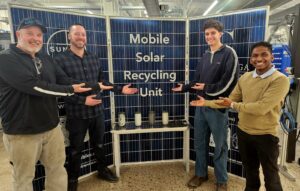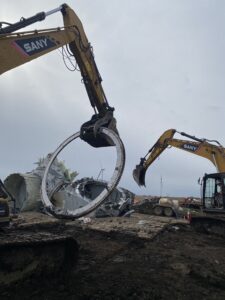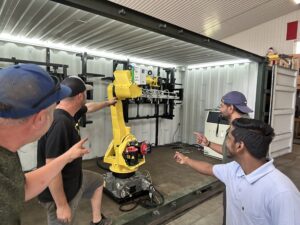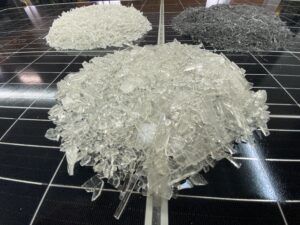Renewable Energy Waste Recycling
Projects Sponsor
Fully Indigenous owned sustainable solutions company SUNSET Renewable Asset Management is pioneering the first-of-its-kind renewable energy waste recycling industry in Canada. By working to recover critical minerals and preserve natural resources from early loss, re-powered, and end of life solar, wind, and battery energy storage systems, SUNSET is a shining example of the circular economy at work, Sunset Renewables is putting the “renewable” in “renewable energy.” The team has developed an innovative mobile solar recycling unit, processed over 75,000 end-of-life solar modules, decommissioned 2 large wind turbines, and worked to ensure the responsible deployment of new renewable energy systems through the provision not >5GW of reclamation reports
As the cheapest, cleanest form of modular energy production, utility, commercial, and residential solar installations are experiencing exponential growth. That has left Canada (and indeed, the world) with a significant unmet need for renewable energy waste recycling.
More demand for renewable energy inevitably means more manufacturer defects, construction or transport damage, and catastrophic weather events that lead to early loss of solar modules which then need to be sustainably disposed of. On top of this, with technology continually improving, and costs coming down day by day, it’s become economical for asset owners to swap out modules for technology with higher efficiency.
 This allows them to generate more power and revenue but often leaves the older technology to be discarded. Last but not least comes the inescapable end-of-life stage where modules are no longer functional—or just the end-of-financed-life phase where land use contracts expire, requiring entire systems to be decommissioned
This allows them to generate more power and revenue but often leaves the older technology to be discarded. Last but not least comes the inescapable end-of-life stage where modules are no longer functional—or just the end-of-financed-life phase where land use contracts expire, requiring entire systems to be decommissioned
SUNSET President Daniel Carrocci has over fifteen years of experience constructing more than 70% of the renewable infrastructure across Canada and Caribbean. This equipped him to recognize this circular economy gap and rally the SUNSET team to fill it.
Before the inception of SUNSET in 2020, Carroci and his team completed significant stakeholder engagement. They identified the two existing North American industry practices for managing renewable energy waste materials: either landfilling or simply abandoning the systems. No technology, infrastructure, processes, or policy existed in Canada to prevent this unique, meant-to-be green waste stream from going straight into the trash.
Looking around the world and attending conferences throughout Europe, the team studied the EU’s Waste from Electrical and Electronic Equipment policy and extended producer responsibility models. They also researched existing technologies for processing solar, wind, and battery materials.
SUNSET also completed a comprehensive economic feasibility study evaluating domestic and global markets, competitors, and technologies. From there it was determined that this was a necessary endeavor which will be economical and, most importantly, sustainable.
Equipped with this knowledge, SUNSET embarked on a mission to develop the technology, infrastructure, and processes to sustainably manage this material. This first-of-a-kind research and development was naturally challenging. The team heard from many government officials and sustainable financing agencies who insisted “it was too early for renewables recycling.”
 As a boots-on-the-ground construction crew working on these projects, the SUNSET team knew that this was not the case. They persevered—completely self-financed—determined to develop the appropriate solutions to what they recognized as pressing issues.
As a boots-on-the-ground construction crew working on these projects, the SUNSET team knew that this was not the case. They persevered—completely self-financed—determined to develop the appropriate solutions to what they recognized as pressing issues.
Given the distributed nature of renewable energy systems, SUNSET recognized that a mobile solution was required. A hub facility was ruled out due to the transportation costs and carbon emissions involved in transporting waste materials across a country as large as Canada. The SUNSET team engaged several prominent Canadian academic institutions to support their effort, leveraging their expertise in fields such as automation, robotics, materials engineering, workforce skills development and sustainability.
Collecting necessary test material required collecting over 30,000 end-of-life/early loss solar modules from various projects across Alberta and Ontario, at no cost to their owners. This involved significant time and monetary investment in transportation logistics and material handling.
Being a pre-commercial startup the team at SUNSET leveraged revenues to finance the necessary costs associated with R&D, materials, talent acquisition and everything else a start-up needs to get off the ground. These revenues came from the construction of several new utility scale solar, wind, and battery energy storage system projects across Canada and Caribbean and the physical decommissioning of two large wind turbines on projects in Alberta and Ontario. The team also produced over thirty-five third party reclamation reports as a consultancy service, helping developing projects across Canada.
 Eventually they were successful in the Innovation Science and Economic Development Solar Recycling Challenge, which helped further support the prototype design and the pilot of a field testing program. SUNSET also won support from the National Research Council Industrial Research Assistance Program, enabling them to perform an economic feasibility study, develop an IP strategy, and file for a US provisional patent. However, a lot of not-paper-work went into the project as well.
Eventually they were successful in the Innovation Science and Economic Development Solar Recycling Challenge, which helped further support the prototype design and the pilot of a field testing program. SUNSET also won support from the National Research Council Industrial Research Assistance Program, enabling them to perform an economic feasibility study, develop an IP strategy, and file for a US provisional patent. However, a lot of not-paper-work went into the project as well.
Countless hours were spent in the shop cutting metal, welding, fabricating, designing electronics, and experimenting with various separation techniques on different makes and models of solar modules, all unpaid. Many failures, and lots of small wins culminated in a device that can efficiently process solar modules into high-quality secondary raw materials.
That result is SUNSET’s mobile solar deconstruction unit, a fully-automated, self-powered, net zero device capable of processing a solar module into clean, raw materials in less than thirty seconds. Housed within a 20′ shipping container, the device produces aluminum, copper, glass, silicon, silver, and plastics. All of these critical minerals and recovered materials can then be reintroduced into a circular economy as commodities to produce new innovative secondary products of value.
 SUNSET’s device promises to slash the cost and carbon associated with transportation of materials by allowing the processed materials to be transported directly to their secondary reuse locations. The system is reliably powered by re-certified secondary solar modules, vertical axis wind turbines, and a hybrid combustion generator. All of these feed into solid state batteries that serve as its energy management system.
SUNSET’s device promises to slash the cost and carbon associated with transportation of materials by allowing the processed materials to be transported directly to their secondary reuse locations. The system is reliably powered by re-certified secondary solar modules, vertical axis wind turbines, and a hybrid combustion generator. All of these feed into solid state batteries that serve as its energy management system.
Designed and tested for the already challenging Canadian domestic market, SUNSET’s mobile solar recycling can be easily exported internationally to support an international circular economy for renewable energy waste materials.













